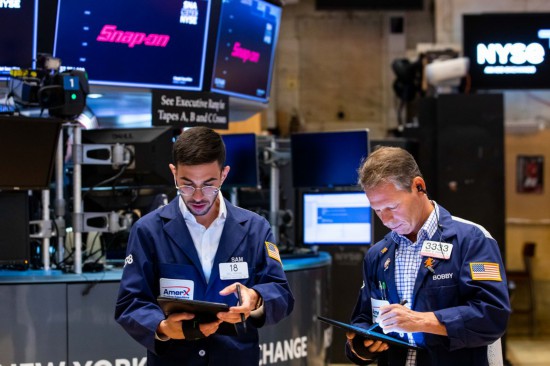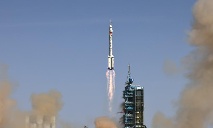U.S. inflation rockets upward, peak unknown

Traders work at the New York Stock Exchange (NYSE) in New York, the United States, June 10, 2022. U.S. stocks fell sharply on Friday as investors fretted about surging inflation. (David Nemec/NYSE/Handout via Xinhua)
"Inflation remains a big problem for Biden and certainly will harm Democrats in November if it continues at such a high rate," says Brookings Institution Senior Fellow Darrell West.
by Matthew Rusling
WASHINGTON, June 11 (Xinhua) -- The U.S. inflation has hit the highest point since December 1981, begging the question of when the worst price hikes in 40 years will peak and drop.
May saw inflation further accelerate, with prices climbing 8.6 percent from the same time last year, according to Friday's monthly Consumer Price Index (CPI) figures from the U.S. Bureau of Labor Statistics.
Stock markets took a dive on Friday, as their hopes were dashed for a quick end to ongoing inflation.
The Dow Jones Industrial Average lost 880 points and the S&P 500 dropped nearly 117 points. The Nasdaq declined 414 points by end of trading Friday.
"Today's very disappointing inflation numbers leave the Fed (U.S. Federal Reserve) little room to take its foot off the monetary policy brake" and regain control over inflation, Desmond Lachman, resident fellow at the American Enterprise Institute and a former official at the International Monetary Fund, told Xinhua.
Indeed, some fear the Fed's interest rate hikes could trigger a recession that would further hammer markets -- which have taken a shellacking in recent months -- as well as Americans' wallets.
There remains no consensus among economists on the pace at which price increases will peak and recede.
Some believe prices will inch their way downward at a snail's pace. Others believe inflation will start to soften over the next two or three months.

People fuel vehicles at a gas station in the Brooklyn borough of New York, the United States, on June 10, 2022. (Photo by Michael Nagle/Xinhua)
Core inflation, which excludes volatile food and energy prices, increased 6 percent, a hair higher than the 5.9 percent estimate.
Contributing to the increase were prices for food, gasoline and shelter.
Energy prices went up 3.9 percent from a month ago, marking a 34.6 percent annual gain. Fuel oil was up by 106.7 percent over the past 12 months.
Food prices rose to 10.1 percent from a year ago.
Dean Baker, senior economist at the Center for Economic and Policy Research, told Xinhua: "We have probably seen peak inflation," but added that a huge amount depends on energy and food prices, which in turn depend to a large extent on the conflict in Ukraine.
"If a cease fire can be arranged, I expect that the price of oil, wheat and a number of other commodities will fall sharply," Baker said.
"This will be huge in lowering inflation," Baker said.
Sam Bullard, senior economist at Wells Fargo, a major U.S. bank, told Xinhua: "For everyone who hoped that headline inflation peaked earlier, unfortunately those have been dashed."
"There's very little relief in sight, at least as far as the coming months go," Bullard said, noting that food and gasoline prices are still climbing.
"Inflation continues to accelerate, we haven't seen the peak yet, and even when we do, coming off of it, the moderation is going to be painfully slow," Bullard said.

People are seen at the parking lot of a grocery store in the Brooklyn borough of New York, the United States, on June 10, 2022. (Photo by Michael Nagle/Xinhua)
Lachman said the recent spike in international oil prices to over 120 dollars a barrel throws into doubt any notion that inflation will peak anytime soon.
Some analysts fear that inflation threatens to spur the Fed to hike interest rates to the point at which a recession could be triggered.
If that happens, markets would undoubtedly dive further, even after dropping from record highs in recent months.
Since the start of the year, declining equity and bond market prices have resulted in the evaporation of around 12 trillion dollars in household wealth, Lachman noted.
Any further loss in such wealth "must heighten the risk that we are in for a hard economic landing by early next year," Lachman said.
Meanwhile, the White House is feeling voters' anger over the issue.
U.S. President Joe Biden's job approval stands at record lows, hitting 39.4 percent, according to Real Clear Politics' average of polls.
"Inflation remains a big problem for Biden and certainly will harm Democrats in November if it continues at such a high rate," Brookings Institution Senior Fellow Darrell West told Xinhua. ■
Photos
Related Stories
- Private prisons in U.S. emerge as “money printing machines” pursuing profits under pretext of serving “justice”
- Situation of refugees and migrants to the US worrisome as border becomes more impenetrable
- U.S. politicians should ditch political tricks
- Arbitrary torture at U.S. “black sites” violates human rights
- Washington in no position to give moral lessons: Uruguayan writer
Copyright © 2022 People's Daily Online. All Rights Reserved.









